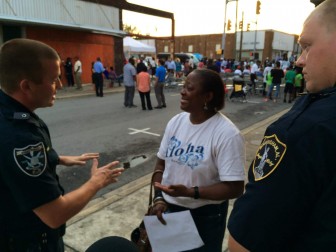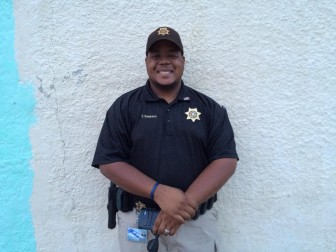The Junction: We Won’t Be Next
After police shootings and racially-charged murders this month, the national conversation is once again focused on the fraught relationship between police and black communities. To address these tensions, The Birmingham City Council recently hosted a forum in Ensley called “We Won’t Be Next.” Rachel Osier Lindley brings us the latest in our series, The Junction: Stories from Ensley, Alabama.
On a humid Tuesday evening, people walk from all directions towards a makeshift stage at the intersection of 19th Street and Avenue F.
“On behalf of the Birmingham City Council, I want to welcome each and every one of you to District 9 and downtown Ensley,” says Birmingham City Councilman Marcus Lundy, who represents Ensley.
“Ensley is alive. Ensley is full of families, Ensley is full of business, and, today, Ensley is full of you,” he tells the crowd.
Dozens of people fill folding chairs in the middle of the blocked-off street. They’re here to talk about the relationship between Birmingham cops and the community. This month’s murders of law enforcement officers in Dallas and Baton Rouge, and the killings of two black men by police, way heavy on the crowd.
A panel of community leaders and activists shuffle onstage. After introductions, Birmingham City Council President Johnathan Austin takes the mic.
“It is time out for all of this senseless violence that’s going on in our communities, whether it’s being done by the citizens or the police.” says Austin. “But I know folks are tired also of being mistreated. And then when you talk about giving your complaints, you feel like those complaints are going unheard. Well, we’re tired of that.”
“I don’t want anybody to die. And that’s really, really sad,” says attendee Olivia Thompson. But, she adds, “People think that the police are just harassing young, black men. I have been harassed by young, white police officers myself, and I’m a black lady. So it bothers me.”
Thompson isn’t alone. It seems everyone in the crowd has a story. When Austin turns the mic over to the crowd, one by one, people get up to tell their stories. One man says he was arrested for a crime he didn’t commit; another talks about the general lack of civility people have towards each other. There’s raw emotion, frustration, calls for action.
Avee-Ashanti Shabazz is with Black Lives Matter Birmingham. When his turn comes, he starts stirring up some in the crowd.
“We come today in the spirit of Malcolm X, of those who said enough is enough,” shouts Shabazz. “Those who said we want our liberation by any means necessary.”
And Shabazz questions the City Council’s motivation behind the holding the forum.
“It’s election season. The election is around the corner, and they’re trying to take your passion, your pain and trying to manipulate it into a political position,” he tells the crowd, gesturing to the stage. “That’s what they’re doing!”
“I don’t like the way they were addressing it,” says Corliss Cowart, who starts to leave as the gathering gets rowdy.
“I understand they’re angry. But you can’t get anything done by screaming, because you’re not going to hear what the other person is saying,” remarks Cowart.
She decides to initiate her own dialogue with Officer Brandon Hill. He patrols in Ensley, and is here working security for the event.
“What is the first protocol y’all need to do when you approach someone sitting in the car?” Cowart asks Hill.
“We probably make sure we can see their hands,” Hill responds. “That’s what I normally do. If I can see your hands, that means everything is safe.”
Cowart has lived in Ensley for 35 years. She says the police in Ensley generally treat her well, but she knows many people who have had bad experiences.
Ensley resident Truman Sampson stands nearby. He says he was once stopped and hassled by a white police officer who accused him of dealing drugs.
“I put my hands up. I did what he told me to do,” Sampson recalls. “But I feel like he really wanted me to show some sign of resistance so he could deal with it a different way.
Sampson notes he wasn’t wearing what he has on today: his uniform. He’s a bike patrol officer at the Birmingham Jefferson Convention Center. He says he’s always wanted to be a cop, to work inside the system to make things better. He recently put in his application with the Birmingham Police Department.
“I would love to work in my community to make a difference,” says Sampson. I’ve been in Ensley 26 years – born and raised – and I’d love to be a police officer in the same community I grew up in.”
His main motivation? “To try to change the stuff that I saw coming up, and to try to make a better relationship between citizens and police.”
Sampson says he bets most people would think he’d change his mind after the murders of police officers in Texas and Louisiana. But Sampson says, “Once I cross that point of my life and become a police officer, I know that my life no longer belongs to me. It belongs to the citizens I go out there and protect and serve every day. That’s already in my head. So if I get killed doing that, at least I get killed doing something that I love and have a passion for.”
This story is part of The Junction: Stories from Ensley Alabama. For more about the series, visit junctionstories.com. The Junction is produced by Mary Quintas and brought to you by WBHM and Finding America, a national initiative produced by AIR, the Association of Independents in Radio, Incorporated. Financial support comes from the Corporation for Public Broadcasting, the Wyncote Foundation, the John D and Catherine T MacArthur Foundation, and the National Endowment for the Arts.
US military used laser to take down Border Protection drone, lawmakers say
The U.S. military used a laser to shoot down a Customs and Border Protection drone, members of Congress said Thursday, and the Federal Aviation Administration responded by closing more airspace near El Paso, Texas.
Deadline looms as Anthropic rejects Pentagon demands it remove AI safeguards
The Defense Department has been feuding with Anthropic over military uses of its artificial intelligence tools. At stake are hundreds of millions of dollars in contracts and access to some of the most advanced AI on the planet.
Pakistan’s defense minister says that there is now ‘open war’ with Afghanistan after latest strikes
Pakistan's defense minister said that his country ran out of "patience" and considers that there is now an "open war" with Afghanistan, after both countries launched strikes following an Afghan cross-border attack.
Hillary Clinton calls House Oversight questioning ‘repetitive’ in 6 hour deposition
In more than seven hours behind closed doors, former Secretary of State Hillary Clinton answered questions from the House Oversight Committee as it investigates Jeffrey Epstein.
Chicagoans pay respects to Jesse Jackson as cross-country memorial services begin
Memorial services for the Rev. Jesse Jackson Sr. to honor his long civil rights legacy begin in Chicago. Events will also take place in Washington, D.C., and South Carolina, where he was born and began his activism.
In reversal, Warner Bros. jilts Netflix for Paramount
Warner Bros. says Paramount's sweetened bid to buy the whole company is "superior" to an $83 billion deal it struck with Netflix for just its streaming services, studios, and intellectual property.








